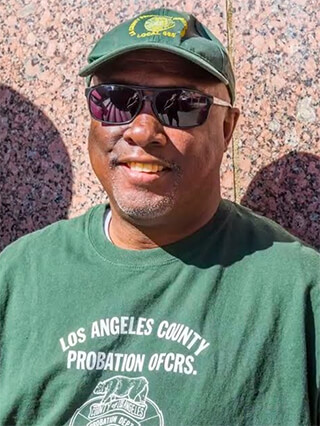A probation officer puts juveniles on ‘the right path,’ even as he faces a detour

“I’m not hired to judge. I’m hired to help you get rehabilitated,” says Deputy Probation Officer Stacy Ford, of his philosophy in working with the juveniles living at Camp Afflerbaugh, a detention center run by Los Angeles County Probation Department.
Withholding judgment isn’t easy, but it’s essential for Ford, our latest Never Quit Service Award winner, to do his job.
The 20 or so teenagers Ford supervises in the sprawling camp have committed murder, rape, robbery and other serious crimes.
“If I focused on what they did, I would hate those kids,” says Ford. “Some of them have done some egregious things.”
But Ford, a member of AFSCME Local 685 (Council 36) and a 15-year veteran of the L.A. County Probation Department, would rather focus on getting the teenagers he works with on the right path. In addition to making sure the juveniles receive the services they need, from drug treatment counseling to mental health counseling to education, Ford plays many other roles.
“I wear multiple hats,” says Ford. “I could be a father to some, an uncle, a brother, a pastor. I’m dealing with multiple kids with all kinds of issues. I don’t wear the same hat for all kids.”
Ford has one goal in mind: “I’m motivating them to live a productive life. While they’re with me, I’m trying to steer them on the right path.”
That’s easier said than done.
Meeting resistance
Kids who’ve never had a father figure, who’ve grown up entrenched in gangs, may be apprehensive when someone like Ford tries to connect with them.
“They don’t want to hear it,” Ford acknowledges.
For others, his efforts to help may trigger memories of past abuse. His solution? Listening and humor.
“That’s always worked with me. I have a personality with a lot of humor. I make the situation not be as bad as it appears to me. So we connect,” Ford says.
Working with young people has always been Ford’s calling. He’s been a youth pastor and, before becoming a probation officer, Ford was an L.A. school bus driver for 22 years.
“This is what I do,” says Ford. “I enjoy motivating young people to do the right thing.”
There are success stories as well as failures. Ford says that he’ll often see kids who’ve come through Camp Afflerbaugh when he’s grocery shopping or at the mall nearby.
“I’ll hear a kid say, ‘Deputy Ford!’ I’ll look back and see the kid working. They’ll say, ‘I got out and I’m working. I’m doing good.’”
Theodore Cha, who nominated Ford for the Never Quit award, wrote in his nomination statement that Ford sets an example for his co-workers.
“He truly represents the professionalism of (a) probation officer, helping delinquents and teens to grow their lives to become productive community members,” Cha wrote.
Waging a secret battle
That Ford has the wherewithal to stay upbeat and humorous among kids convicted of such serious crimes is remarkable on its own. But even more remarkable is that since 2018, Ford has been battling sinus cancer, and has had to endure devastating treatments.
“When they diagnosed me, they didn’t give me any hope. They said I had a rare form of cancer. It was spreading rapidly. I was going to have to several surgeries, chemo and radiation treatments for about a year,” Ford recalls. “During that time, I kept praying. I had goals to accomplish before I died.”
One of those goals was to write and publish a book. Since he was a child, Ford had always been interested in writing. Despite his grueling treatment regimen, Ford wrote nine manuscripts, one of which, “Suicide is Not an Option,” is based on a teenager he worked with at Afflerbaugh.
“He wasn’t a bad kid, but he was a drug addict. He was very smart. He was good at reading and math, excellent in all sports. The only problem is, he was a victim of domestic violence. His stepfather would beat him and his mom,” Ford says.
Ford became close with the kid, who was eventually released after nine months. One day, Ford heard some fellow officers talking and learned that the boy had committed suicide.
“The drugs had taken a toll on him,” Ford says. “His relationship with his mother was horrible and his girlfriend had just broken up with him. He decided to take his own life.”
Even during the depths of cancer treatment, treatments so severe they damaged his hearing (he now requires hearing aids), Ford was motivated to write a book to “let kids know that life is bad, but it’s not that bad. There are outs. You don’t have to take your life.”
Now, a year into remission, Ford is grateful for his job, which gives him purpose.
“I never stopped working when I was sick,” he says. “If I didn’t do that, I would die.”